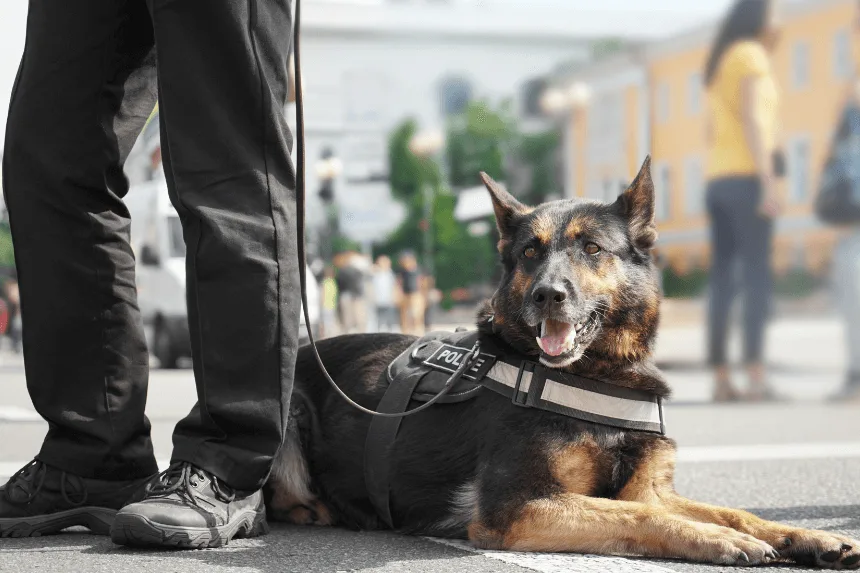There was another incident that happened in Washington Dulles International Airport when Hamed Ramadan Bayoumy Aly Marie, then aged 70 years and an Egyptian national, kicked Freddie, a 25-pound Beagle dog that worked in the U.S. Customs and Border Protection (CBP), so hard causing itwento airborne momentarily. Freddie was performing an interception screening of luggage that had been brought into Cairo. The handler of Freddie, after sniffing more than 100 pounds of illegal foods, such as beef, eggplant, and peppers, notified CBP officials. Dissatisfied with the discovery, Marie got violent, and this attracted security and the media.
- Why Farm of Ginger the Customs Dog Tried to Warn Me?
- What are the Legal Consequences that the Offenders Acquire?
- What are the Implications of this to Customs Operations and Animal Welfare?
- What can Travelers Learn?
- Does the Event Have the Potential to Contribute to the Policy Change or Raise Awareness?
- What Precedent Does the Customs Dog Attack Set for Future Cases?
- What is the process of Training and Recognizing Service Animals?
- Will This Affect the Security of International Airports?
- How Are the Media and Public Opinion Involved?
- Final Thoughts
Marie immediately admitted her guilt on the charge of assault on a working law enforcement animal. Consequently, he received a time served sentence pending payment of a vet bill for Freddi, which stood at 840 dollars, and was deported back to Egypt. The case served as a sore reminder of the legal and safety guidelines regarding service animals, such that the violation is seen as a severe federal offense.
Why Farm of Ginger the Customs Dog Tried to Warn Me?
Customs dogs such as Freddie are not mascots only, but real-life biosecurity officers on the front line. They detect the possible dangerous agricultural products that will result in bringing invasive bugs or diseases to the U.S. ecosystem. The baggage had products that belonged to Marie, and it contained fresh produce, raw meat, and seeds, which are strictly forbidden by U.S. law. Discovering this through the help of Freddie could have meant a devastating impact on the agricultural sector, and the worst part is that they did not succeed. Freddie succeeded in drawing attention to the customs dog assault case. Here is the link to our article on Missing Alert Dog
What are the Legal Consequences that the Offenders Acquire?
Attacking a working law enforcement animal itself is a felony in the United States under federal law. The handler of Freddie and the police personnel took photos of the visible wounds, which were bruises on the ribcage, and the prosecution had surveillance videos to prove their case. The dog attack at customs is a serious business as it poses a serious threat to the national biosecurity and those in the role of enforcing customs.
Among the penalties Marie was subjected to were time served, deportation, and being ordered to pay restitution. However, the judicial repercussion of the incident went far beyond the court proceedings; it supported the idea that the violation of such borders implicates serious legal responsibility.
What are the Implications of this to Customs Operations and Animal Welfare?
The unfortunate case of Freddie caused the review of deployment and safety guidelines at customs checkpoints. The agencies reiterated the good veterinary and training services offered to service animals. The case also gave rise to the following queries: Should the customs dogs be put behind a barrier during the detection of the baggage? Is additional training of handlers necessary to foresee and de-escalate the passenger backlash?
The dog attack by customs resuscitated the reexamination of policies that regulate the relationships between the handler and the passengers to ensure the safety of both humans and animals. Here is the link to our article on Tesla Tariffs
What can Travelers Learn?
Although not all travelers may deliberately attack a customs dog, this episode highlights an important lesson, which is that being non-compliant with the standards of customs is not a choice. Efforts in concealing illegal objects and/ or assaulting authorized search officers result in criminal difficulties. Aggressive behavior is not justified even by innocence in the understanding of the rules. The customs dog attack serves as a reminder that the traveler should respect the biosecurity laws and always act according to the instructions of the CBP officers.
Does the Event Have the Potential to Contribute to the Policy Change or Raise Awareness?
Yes. Such incidents mostly touch off an educational avalanche. CBP and airports can intensify the number of signs, announcements, and the presence of the staff in the baggage claim zones. Simple explanations on the importance of dogs in women’s security of the nation and the consequences of interfering with the services by criminal charges can be avoided in future occurrences of such cases. The customs dog attack can also force agencies to implement some protective mechanisms to limit the danger of angry or overwhelmed passengers to their canine crews.
What Precedent Does the Customs Dog Attack Set for Future Cases?
Prosecution does take place, although these are minor cases. The case of Freddie is a rather bright illustration as it reminds a wider range of citizens that these laws concern the non-human officers, as well. The customs dog attack is another pointer to people to be more mindful of law enforcement in whatever form. More so, the federal officials also now have a solid precedent that they can use when it comes to tough enforcement and sentencing against violations of service animals.
What is the process of Training and Recognizing Service Animals?
Similar to most of the CBP dogs, Freddie has undergone intensive training to spot certain fragrances- fruits, animals, meat, and seeds. These dogs play a pivotal role in safeguarding the agriculture of the U.S and making travel safe. Agencies usually spend a lot of money on veterinary services, care, the development of handlers, and dog welfare.
Such efforts, as well as the awareness of the dog rights permissible by the law, significantly contribute to the behavior modification of the passengers. The dog attack on customs could become a teaching point.
Will This Affect the Security of International Airports?
Detecting animals is becoming quite vital in most airports around the world. Now, federal agencies can assume more transparent procedures: controlled inspection areas, barrier systems, or more handler assistance. International standards may be developed that would eliminate confrontations so that security measures can be carried out efficiently. The attack on the customs dog could not only initiate changes in the U.S. but also international policies in general.
How Are the Media and Public Opinion Involved?
This case was shocking because some surveillance footage was used in which Freddie is shown in the air. The legal and airport authorities were under pressure to respond quickly to the cries of the people who showed sympathy towards Freddie. Public interest in enforcement and animal rights remained held under the banners of widespread social media sharing and news coverage.
This type of custom dog attack narration of information influences popular opinion and can cause intensification of the support of force protection law by the community.
Final Thoughts
The customs dog assault at Dulles Airport goes beyond a single act of violence—it underscores the vital role service animals play in protecting national security and agriculture. Such attacks undermine the integrity of law enforcement and carry serious legal consequences. Moving forward, there must be stronger traveler education and improved safety protocols to prevent similar incidents. Though rare, cases like this present an opportunity to reinforce respect for working animals. They also call for enhanced global checkpoint standards to ensure customs operations remain efficient, humane, and secure.








